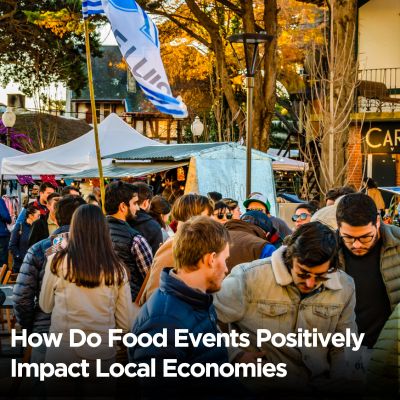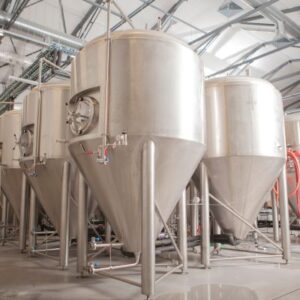Food events and festivals are now a regular part of life in cities, towns, and rural areas. What began as simple community gatherings has become a way to bring people together and support local businesses.
From small farmers markets to large regional food festivals, these events give people a reason to visit new places, try local flavors, and spend money in ways that benefit the area.
They also help boost the economy. A study of food festivals in Wales reported that organiser spending reached £1.4 million, while visitor spending added £3.82 million. Visitors from outside Wales contributed an additional £3.7 million to the local economy.
This blog looks at how food events impact the local economy by creating jobs, supporting small businesses, and bringing long-term value to communities.
What is Food Tourism?
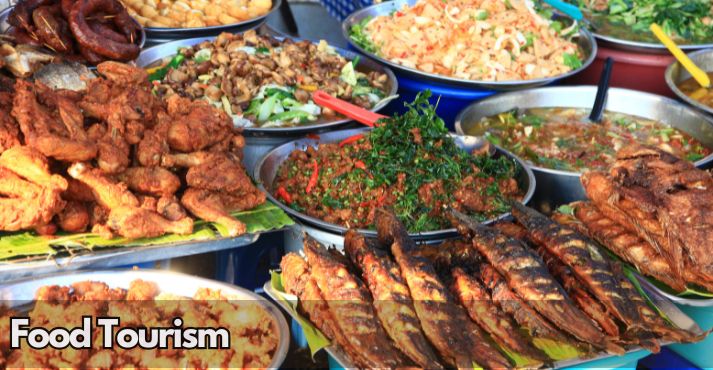
Food tourism means traveling to experience a place through its food and beverages. It includes activities like visiting farmers’ markets, attending food festivals, taking cooking classes, going on food tours, or simply dining at local restaurants.
These experiences help people understand a region’s culture through what is grown, cooked, and shared at the table.
Food is now one of the main reasons people choose where to travel. Many younger travelers plan their trips around what they can eat, whether it is a famous local dish or a chance to try something completely new.
This kind of tourism allows visitors to enjoy local flavors while supporting the businesses that create them.
According to recent data, the global food tourism market was valued at $16.58 billion in 2025 and is estimated to reach $85.04 billion by 2034. This rise shows how common it has become for people to seek out food experiences when they travel.
Food tourism is also closely linked to community growth. When visitors spend at local food events, they help small producers, family-run eateries, and market vendors.
This is how food tourism helps local communities — by keeping money in the area and supporting people who work in food and hospitality.
Why Food Events Matter for Local Economies
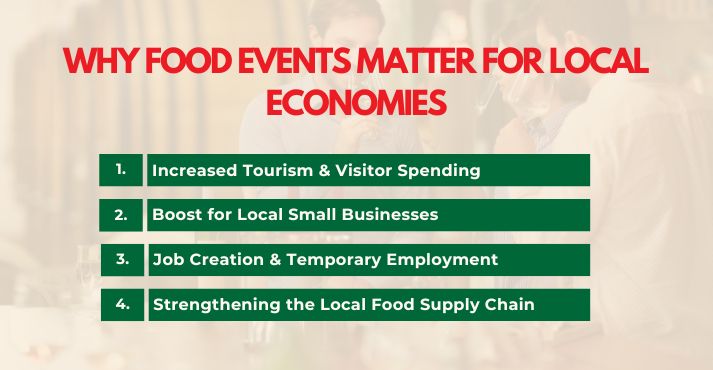
Food events do more than offer good meals and entertainment. They bring people into a community, create new business opportunities, and keep money circulating locally.
These events encourage visitors to explore local neighborhoods and support a range of businesses, creating a lasting economic boost.
1. Increased Tourism and Visitor Spending
Food events draw both residents and visitors from other towns and regions. People travel to enjoy local dishes, discover new flavors, and learn about a community through its food and beverages. When they attend these events, they also spend money on hotels, shops, and other attractions.
For example, Pembrokeshire Fish Week in Wales attracted around 32,000 people in 2014 and generated £2.7 million for the local economy. This shows how these gatherings can generate significant local revenue in a short period.
2. Boost for Local Small Businesses
Food events create significant opportunities for small businesses to expand. Local restaurants, food trucks, caterers, and artisans meet new customers who might not have discovered them otherwise.
Pop-up vendors, farmers, and small food brands also have a chance to showcase their products to a wider audience.
Increased foot traffic at these events can lead to more repeat customers in the future. Many people return to visit a restaurant or buy from a vendor they first tried at a festival.
This steady support helps small businesses build stronger relationships with the community and stay active for the long term.
Attending a food service trade show can further amplify these opportunities by connecting small businesses with industry buyers, distributors, and media exposure.
3. Job Creation and Temporary Employment
Large and small food events often lead to increased job opportunities. These can include short-term or part-time positions in hospitality, event setup, cleaning, security, and retail. Even small festivals rely on many extra hands to make things run smoothly.
Beyond direct hires, there is an indirect employment effect. Local transport companies, printing shops, marketing teams, and security services also benefit from this initiative. By creating this web of opportunities, food events help more people find work, even if only for a few days.
4. Strengthening the Local Food Supply Chain
Food events also support the local food system by providing producers with a direct platform to connect with customers. Farmers, cheese makers, brewers, and other suppliers often see strong sales during these events. When demand rises, they can reinvest in their businesses and expand their reach.
Stronger local demand means more money stays in the region, rather than being sent to outside distributors. Using more sustainably sourced ingredients also becomes easier when producers know there is community support.
Visitors who learn about local food at these events often look for the same products afterward, which helps keep local dollars circulating.
Events like the best food service trade shows show the value of local connections and can inspire partnerships that continue well after the event is over.
Long-Term Economic Effects of Recurring Food Events
When a town or city hosts a food event every year, it does more than bring visitors for a single weekend. Over time, annual festivals help build a place’s reputation and make it known as a food destination.
This type of branding attracts more tourists in the future, brings new business ideas, and creates local pride.
The multiplier effect is important in this process. Money spent at a food event moves through many local hands.
For example, when someone buys a dish from a local vendor, that vendor might pay a nearby farmer for produce, hire local workers, or buy supplies from a neighborhood shop.
According to a study, for every dollar spent at a local business, about 68 cents stay in the community.
Recurring food events encourage small business growth by providing vendors and chefs with more opportunities to meet new customers. Over time, these businesses often grow their services, introduce new menu items, or open additional locations.
There are also wider economic benefits of food festivals. Hotels, shops, and transport companies all welcome more business during these gatherings. Suppliers who provide tents, equipment, and services such as printing or advertising also see more demand.
A trade show focused on local or regional food products can add even more value by creating new business connections.
Many events today focus on local and sustainable food, which appeals to visitors who want to support area farms and producers.
By keeping food dollars within the community, these events help local producers and businesses stay strong and continue serving their customers year after year.
Social and Cultural Benefits That Drive Spending
Food events do more than offer a chance to eat good food. They help bring people together and create a sense of pride in local traditions.
When residents see their town or city celebrated through food, it builds stronger ties among neighbors and inspires people to get involved in community activities.
This sense of pride can lead to increased support for local businesses and encourage residents to spend their money locally.
These community benefits of culinary events also support long-term economic stability. A lively, welcoming atmosphere attracts visitors who want to experience authentic local life.
As more people attend events, they are likely to return for other activities, recommend the destination to friends, or revisit a restaurant they enjoyed during the event. This repeat tourism helps keep restaurants and shops busy throughout the year, not just on festival days.
A recent Eventbrite report shows that nearly 80% of attendees say live events make them feel more connected to others and their community. This stronger connection encourages ongoing local spending during food events and supports other small businesses throughout the year.
Food events also connect with ecotourism by often promoting local and seasonal ingredients, which appeals to visitors interested in sustainability.
Many organizers use these gatherings as part of their restaurant marketing strategy to introduce new dishes or highlight partnerships with local farmers.
When people form a strong social bond with a place and enjoy authentic experiences, they are more likely to support it financially. In this way, food events support both community spirit and the local economy simultaneously.
Examples of Food Events with Big Economic Impact
Here are quick snapshots of two well-known food events that have a substantial impact on their local economies:
Taste of London (Regent’s Park, UK)
This annual festival gathers over 50,000 food lovers during its four-day run. Featuring top chefs and a showcase of local and international cuisine, it brings more visitors to the area and supports nearby hotels, restaurants, and retail outlets.
Smorgasburg (New York City, USA)
Often called the “Woodstock of Eating,” Smorgasburg welcomed more than 2 million visitors across its New York, Los Angeles, and Miami markets in 2023.
With over 100 independent vendors, it generates significant income for small food businesses and attracts both locals and tourists to its open‑air markets each weekend.
These festivals show that food events help bring in tourists, support small businesses, and encourage more local spending, all of which add to the local economy.
How Cities Can Maximize the Economic Potential of Food Events
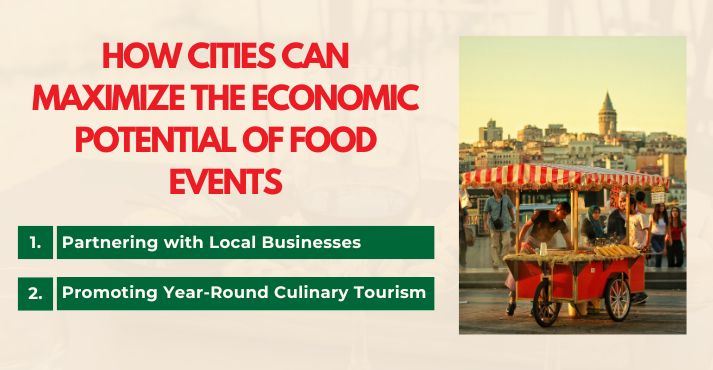
When planned carefully, food events can bring benefits that last long after the festival ends. Cities that continue to support and promote these gatherings throughout the year can create steady growth and build strong connections with the food service industry.
Below are two ways cities can maximize the economic benefits of food tourism:
1. Partnering with Local Businesses
Involving local producers, chefs, farmers, and artisans helps make a food event feel authentic and connected to the community. Working closely with these groups also helps showcase regional ingredients and stories that make the event unique.
Public and private partnerships, such as those with tourism boards or business associations, can help with planning, funding, and promotion. These efforts provide small businesses with more opportunities to reach new customers and establish lasting relationships.
Supporting small business growth through food events keeps money local, encourages visitors to return, and promotes local economic development.
2. Promoting Year-Round Culinary Tourism
Cities can keep the energy from a big food event going all year. Creating food trails, offering guided tasting tours, and running seasonal food promotions help keep visitors interested in different seasons.
When visitors have many chances to explore a city’s food scene, they are more likely to stay longer, spend more, and recommend the experience to friends and family. This helps a city become known as a food destination and brings steady business to local restaurants and shops.
Sharing the stories behind local dishes and the people who create them helps build stronger bonds with both locals and visitors. By offering different food experiences throughout the year, cities can turn a single event into long-term economic success.
Final Thoughts
Food events are more than fun weekends filled with good food and music. They bring real economic value by attracting visitors, supporting small businesses, and keeping money in the local community.
Cities and towns that treat these events as long-term investments can build stronger local economies and create a unique identity that draws people back year after year.
Local governments and food entrepreneurs should see these gatherings as chances to grow, not just entertain.
When we choose to support or attend local food festivals, we help create jobs, encourage local spending, and celebrate the flavors that make each place special. Find a food event near you and be part of the growth in your own community!

